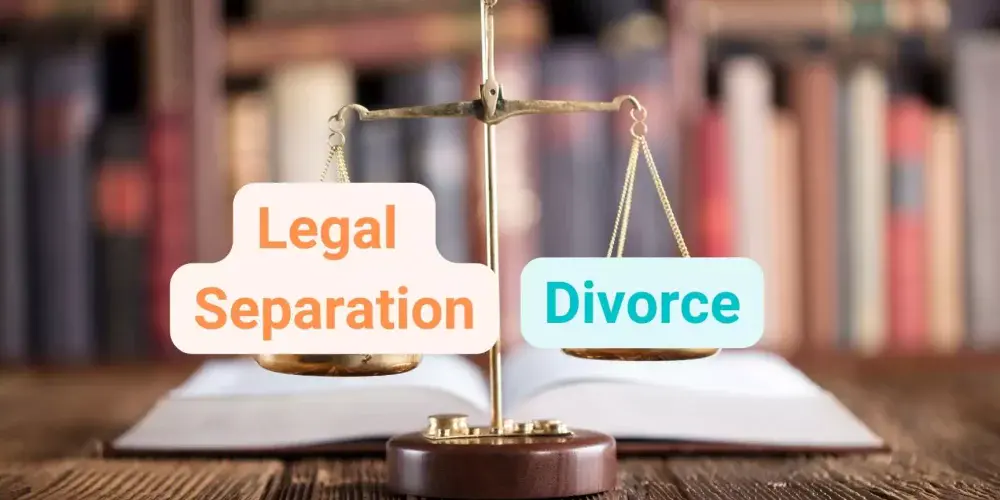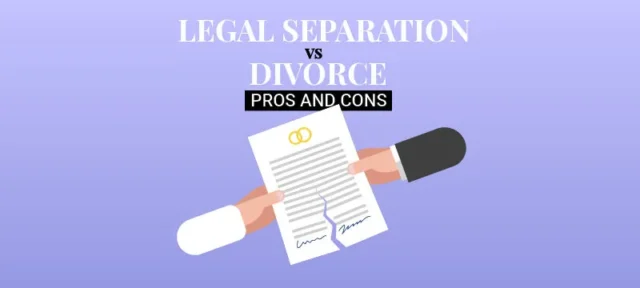
Legal separation and divorce are two options for couples who are struggling in their marriage. While both options involve the couple living apart, there are significant differences between the two. Legal separation is a court-approved agreement that allows a couple to live separately while remaining legally married. Divorce, on the other hand, is the legal termination of a marriage that can be done with the help of a Napa divorce lawyer who is a professional in their field.
Legal separation and divorce are two distinct processes with key differences. Legal separation does not terminate a marriage, hence preventing remarriage but allowing for independent living and decision-making regarding property, finances, and child custody. It’s often suitable for couples uncertain about divorce or those with personal or religious beliefs against it.
The process for legal separation involves filing a court petition and attending a hearing, with agreements required on property division, child custody, and spousal support. Conversely, divorce terminates the marriage and involves a more complex, lengthy legal process with additional paperwork and court appearances, yet still requires mutual agreement on similar issues.
Legal Separation vs Divorce: Key Differences

Legal separation and divorce are two ways to end a marriage. While both options involve a legal process, there are some key differences between them. Here are some of the most important differences to consider:
Marital Status
One of the biggest differences between legal separation and divorce is that legal separation does not end the marriage. The couple is still legally married, but they live separately and have a court order that outlines their rights and responsibilities. This means that they cannot remarry, as they are still legally bound to each other.
In contrast, divorce permanently ends the marriage. The couple is no longer legally married and is free to remarry if they choose to do so.
Next of Kin
Another important difference between legal separation and divorce is how the couple is treated in terms of next of kin. In a legal separation, the couple is still considered to be each other’s next of kin. This means that they can make medical decisions for each other and inherit from each other if one of them passes away.
In a divorce, however, the couple is no longer considered to be each other’s next of kin. They may need to update their estate planning documents to reflect this change.
Remarriage

As mentioned above, legal separation does not end the marriage, so the couple cannot remarry. In contrast, divorce permanently ends the marriage, so the couple is free to remarry if they choose to do so.
Remarriage is a significant aspect differentiating legal separation from divorce. In cases of legal separation, while couples may live apart and address financial and custody matters independently, their marital status remains intact. This means that neither party can enter into a new legal marriage while still legally bound to their spouse.
On the other hand, divorce provides a clear legal termination of the marriage. Following a divorce, individuals regain their single status and are no longer bound to their former spouse. This newfound legal freedom allows individuals to remarry if they wish to enter into a new marital relationship.
Understanding the distinction between legal separation and divorce concerning remarriage is vital for individuals contemplating their future and potential relationships.
Bigamy
Bigamy is the act of marrying someone while still legally married to someone else. It is illegal in most states. If a couple is legally separated but still married, they cannot remarry without first getting a divorce. If they do remarry, it would be considered bigamy and could result in legal consequences.
Engaging in bigamy can have serious legal consequences, including criminal charges and potential imprisonment. Courts take a firm stance against bigamy to uphold the integrity of marriage and protect the rights of all parties involved. Therefore, it is crucial for individuals considering a new marriage to understand the legal implications and ensure that their previous marriage has been properly dissolved through divorce before entering into a new marital union.
Children and Custody Issues
The welfare of children is a crucial concern in both legal separation and divorce, with child custody and support being primary issues and many asking, how to get my kids back? Courts allocate parental rights and responsibilities in legal separation, including decision-making rights and physical custody.
Similar principles apply in divorce, although factors like parents’ residential distance or the child’s preference may necessitate sole custody to one parent while granting visitation rights to the other.
Child support, usually paid by the non-custodial parent, is determined by both parents’ income and the child’s needs. Notably, these arrangements are subject to change based on evolving circumstances, necessitating legal consultation and court involvement for modifications.
Emotional Considerations

Legal separation and divorce can be emotionally challenging. Couples may experience stress, sadness, and anxiety during the process. It’s essential to seek emotional support from friends, family, or counseling services to navigate these feelings.
Financial Considerations
Both options can have financial consequences, such as dividing assets and potential alimony or child support payments. Consultation with financial advisors or attorneys can help individuals make informed decisions about their financial future.
It’s crucial to assess the long-term financial impact of these choices, including property division and ongoing financial responsibilities, to ensure a stable financial outlook after separation or divorce.
Counseling and Mediation
For couples facing marital difficulties, counseling or mediation services can provide an opportunity to explore alternatives to separation or divorce. These services focus on communication, conflict resolution, and potentially preserving the marriage.
Remember that the choice between legal separation and divorce is a personal one, influenced by individual circumstances, values, and goals. Seeking legal advice and emotional support can help individuals and couples make the best decision for their unique situation.
Conclusion

Legal separation and divorce are distinct processes for ending a marriage, each with its own set of considerations regarding property division, child custody, and other factors. While reconciliation and mediation offer alternatives to court, the growing trend of online divorce services also presents its own pros and cons.
The choice between separation and divorce hinges on each couple’s unique circumstances, including financial situation, children, and personal values. Emotional and practical challenges are bound to surface during the process, but with proper support and guidance, couples can successfully transition and progress in their lives post-separation or divorce.









